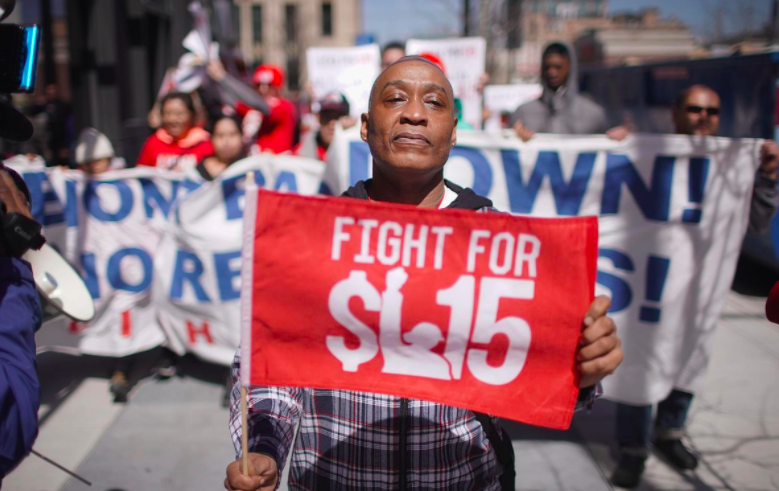“I don’t think it’s a living wage”: UWL Students react to the minimum wage debate
May 5, 2021
The federal minimum wage was introduced in 1938 under the Fair Labor Standards Act. This was the first time the federal government issued a base pay for workers and it started at 25 cents an hour. Since then, the minimum wage has changed 22 times. As of today, in the year 2021, we have had the longest stagnant minimum wage in history.
According to the Pew Research Center, the minimum wage peaked in 1973. In 1973, the minimum wage was $4.03, which has the same purchasing power as $23.68 would have in 2018.
The minimum wage debate has been an ongoing issue in political realms. The current federal minimum wage is $7.25 an hour. The last time the minimum wage was raised was in 2009. Democrats in Congress have proposed a raise to $15 an hour and had originally attached it to the most recent stimulus package.
In January, Democrats proposed the Raise the Wage Act of 2021. This would incrementally raise the minimum wage to $15 by the year 2025. According to the Economic Policy Institute, 32 million Americans would be affected by a raise to $15 an hour. This constitutes 21% of the workforce.
According to the Pew Research Center, 67% of Americans support raising the minimum wage. This includes some students at the University of Wisconsin-La Crosse.
Junior, Ryan Sperling, said, “I don’t think it’s a living wage, personally. With just the minimum wage alone, with no outside assistance, there is no way someone can live off of $7.25.”
Sperling said that $7.25 is not enough for young workers either. “I don’t think $7.25 is a sufficient wage for college students considering many college-aged people are paying their tuition on their own.”
Sperling said he doesn’t care who steps up to raise the minimum wage, but he believes someone needs to. “If the federal government does not raise the minimum wage, I think it is important for Wisconsin to be proactive in taking that step.”
The minimum wage increase is said to help racial minorities and women, who are typically overrepresented in low-paying jobs. According to the Economic Policy Institute, the minimum wage increase would affect 31% of African Americans and 26% of Latinos. Sperling said, “The most important thing to this is the racial disparities. I think it’s an issue of racial equality.”
When Sperling was asked about the current debate regarding the minimum wage, he said he supports the full raise to $15 an hour. “I don’t think $15 an hour is an unrealistic ask at all.”
Vice-Chair of the Segregated University Fee Allocation Committee (SUFAC) and Student Association senator, Sydney Navoichick, said, “Obviously it [the minimum wage] is not livable.”
Navoichick said students who make minimum wage would not be able to afford necessities. “I only worked on campus because I lived in the dorms and it gave me money to do fun stuff. Right now, I could not afford my rent if I worked on campus or made the federal minimum wage.”
Navoichick said she agrees with the raise to $15 an hour, but she supports higher wages when needed. “The issue is everyone says if it’s $15 an hour everything else raises. $15 an hour is still not even livable for people in some parts of the country. $15 would be good, but it could definitely be better.”
Navoichick said students on campus would benefit from a rise in the minimum wage. “There is a way it can be done. At the end of the day, the institution is like a business and they can afford it if they really push for it.” She said, “The fieldhouse is going up. I just feel like sometimes the priorities are off.”
Vice-Chair of Administration and Finance Bob Hetzel said UWL’s minimum wage for University Staff and Academic Staff employee positions is currently $14.60. This includes full-time positions with the university. However, the wage scale for student employment starts at $7.25, the federal minimum wage.
According to living wage calculations for Wisconsin, a living wage for a single adult with no children in Wisconsin is $14.02. The wage increases with the number of children.
Junior, Madalyn Lepkowski, said, “I would want to see the minimum wage being at least the cost of living.” Lepkowski said that students can’t afford to pay for necessities even at a higher wage. “I’ve been working 70 hours per paycheck or more on top of my schoolwork being a full-time student. I’m dying.”
Lepkowski said she struggles to pay bills even though she makes more than minimum wage. “I make more than minimum wage and I feel like I’m scraping by to pay my bills and I’m not even a full-fledged adult that has children.”
Lepkowski said she is conscious of how raising the minimum wage could affect small businesses. “I support raising the minimum wage. I just don’t know what the effect will be on certain businesses.” However, she still thinks that the minimum wage needs to raise.
The current suggestion in congress is that the $15 an hour raise would come in increments and would be effective by 2025. Lepkowski said, “It’s good we’re trying to change society and help people out but also how good is that help if it is a decade later.”






